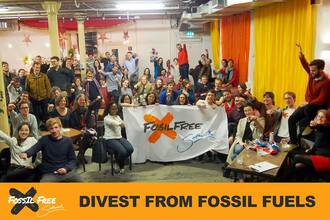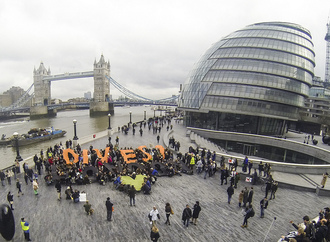-
Divest Martha's Vineyard towns from Fossil Fuels!Our local government has a responsibility to divest from an industry that’s destroying our future, and reinvest in solutions to climate change. We can not count on the federal government, even as extreme weather events like the record rain fall in the Duluth area last Spring overwhelm local budgets. We have the solutions, but we won’t see any political progress on the issue until we can weaken the power of the fossil fuel industry. The bottom line is this: divestment is the only moral choice for governments that care about their citizens. Solving the climate crisis is the only practical choice for governments that care about their solvency. It's time to divest from fossil fuels now!21 of 100 SignaturesCreated by Rachael Curtin

-
Divest Southwark Council’s Pension Fund from Fossil Fuel InvestmentsUPDATE: In December 2016 Southwark Council made a commitment to divest from fossil fuels. We are now working with them to follow through on this commitment. Climate change is the greatest challenge humanity has encountered. The 20 hottest years on record have all occurred since 1981 and 2014 was the hottest ever [2]. Higher average temperatures are directly linked to extreme weather events such as heatwaves, droughts, floods and storms. In the UK, January 2014 was the wettest in 250 years [3]. Scientists have unanimously concluded that these changes are a consequence of human activity, arising from the burning of fossil fuels [4]. Moreover, this activity has resulted in unprecedented levels of air pollution, now regarded as a major world killer [5]. In Southwark, over 100 people die prematurely each year owing to poor air quality [6]. If global warming is to have a chance of staying below a 2°C rise upon pre-industrial temperatures (a limit already considered dangerous), up to 80% of known fossil fuel reserves must be kept in the ground [7]. All available evidence suggests that fossil fuel companies intend to burn the reserves within their control, taking us substantially over the 2°C limit [7]. Moreover, companies such as Shell are actively trying to discover new reserves, often in environmentally sensitive regions [8]. In addition, the fossil fuel industry has been a divisive influence in preventing meaningful legislation on climate change through their intensive lobbying of decision makers and funding of disinformation campaigns [9]. If it is wrong to damage the world we live in, then it is wrong to profit from that damage. Responsible investors should no longer be profiting from these destructive activities and legitimising this action through their tacit support of fossil fuel companies. Southwark’s investments in fossil fuel companies The Southwark Pension Fund consists of £1.2 billion worth of assets [10]. Based on publicly available metrics and the 2014/15 annual report for the Pension Fund, we have conservatively determined that at least £60.6 million pounds within this fund is invested in fossil fuel companies, including: Shell, BP, BHP Billiton, Exxon Mobil, Chevron and Total [10,11]. A recent authoritative financial analysis has demonstrated that across more than 6,000 pension and hedge funds, investors who divested from fossil fuel companies would have earned a 1.2% greater average return since 2010, when compared to conventional investors [12]. Moreover, in the long term these fossil fuel investments will become increasingly unprofitable as the cost of extraction and international treaties restrict the use of fossil fuels [7]. Not only does it make moral sense not to invest in the destruction of our planet, it is also financially prudent. Aligning Southwark’s investments with its values Southwark Council have been exemplary in supporting environmentally sustainable practices. For example, the borough has the highest percentage of Eco-Schools of any local authority in England [13] and in 2010 was awarded £4.35 million for a cavity wall insulation project in 5,000 council homes to both alleviate fuel poverty and reduce energy consumption [14]. Southwark Council has committed to reducing borough wide CO2 emissions by 22.4% by 2020 and 80% by 2050 and states “that energy should be supplied as much as possible from renewable sources on-site or locally. This is less wasteful and will reduce our reliance on remote sources of energy, including imported oil and gas” [15]. Continuing to invest in the fossil fuel industry contradicts the positive steps taken by Southwark Council to lower its environmental impacts. Southwark residents are at risk of climate change, including an increased risk of flooding and elevated levels of air pollution [16], as well as damage to the London economy [17]. It is illogical to allow pension funds to endanger those whose futures they seek to protect. The London Assembly recently passed a motion in favour of divestment and by divesting from fossil fuels, Southwark will join forward thinking institutions, including The British Medical Association, Glasgow University and City Councils such as Oxford and Bristol, amongst many others, in leading by example to help create a sustainable future for the citizens of Southwark and beyond. References [1] http://tinyurl.com/lmskfgk [2] http://tinyurl.com/n4dbbx8 [3] http://tinyurl.com/pw2c42v [4] http://tinyurl.com/3e3zv [5] http://tinyurl.com/pqgdd5q [6] http://tinyurl.com/m2pxrx2 [7] http://tinyurl.com/na7xywd [8] http://tinyurl.com/k5knzss [9] http://tinyurl.com/lswg6w7 [10] http://tinyurl.com/pezzajy [11] http://gofossilfree.org/uk/pensions/ [12] http://tinyurl.com/ls7vh24 [13] http://tinyurl.com/lzgwro4 [14] http://tinyurl.com/luwj97o [15] http://tinyurl.com/m5rlfwk [16] http://tinyurl.com/kttxfc5 [17] http://tinyurl.com/n467mgw1,018 of 2,000 SignaturesCreated by Tytus Murphy
-
Unterstützung der Fossil Free Bewegung in Bad VilbelQuellenangaben zum Brief 1. Intergovernmental Panel on Climate Change (IPCC) http://www.ipcc.ch/report/ar5/wg3/ 2. Artikel zum Finanzrisiko Kohlenstoffblase in der Zeit: http://www.zeit.de/2014/08/carbon-bubble-rohstoff-blase 3. Internationale Energieagentur. World Energy Outlook 2012: http://www.iea.org/publications/freepublications/publication/German.pdf 4. Smith School of Enterprise and Environment, Oxford. Stranded Assets Programme http://www.smithschool.ox.ac.uk/research/stranded-assets/ 5. HSBC, Coal and Carbon - Stranded assets: Assessing the risks https://www.research.hsbc.com/midas/Res/RDV?p=pdf&key=dXwE9bC8qs&n=333473.PDF 6. http://www.theguardian.com/environment/2013/apr/19/carbon-bubble-financial-crash-crisis 7. Liste der Top 200 Kohle-, Erdöl-, Erdgasunternehmen weltweit: https://docs.google.com/a/350.org/spreadsheets/d/1an9qOSE2uG4XuzeA4ltUVadDawheTWdJGKRpU5ayCJk/pubhtml Eine Liste der Städte, Universitäten, Kirchen und anderer Institutionen die sich Divestment verschrieben haben: http://gofossilfree.org/commitments/ Mit dieser Petition rufen wir die lokale Regierung dazu auf 1. die städtischen Geldanlagen und Investitionen der Stadt offenzulegen. 2. jegliche neue Investitionen in fossile Brennstoffunternehmen einzufrieren. 3. eigene Anteile an direkten und indirekten Investments innerhalb der nächsten 5 Jahre abzuziehen, d.h. zu deinvestieren. Dazu gehören Aktien, Mischfonds, Unternehmensanleihen und sonstiges Kapital das fossile Brennstoffe beinhaltet.123 of 200 SignaturesCreated by Jana Peters
-
Fossil Free Cambridgeshire - Divest Now!By continuing to grant social legitimacy to the burning of fossil fuels, rather than investing in transitioning our energy systems to renewables, our councils are complicit in driving unprecedented climate change. The warming of our planet is harming people by the millions through the more frequent extreme weather events hitting communities across the world. Further, changes to the hydrological cycle and rising temperatures are already disrupting food production and water supplies. Scientists have recently estimated that fossil fuel reserves still in the ground are approximately three times the size of that which can be burnt to have a 50:50 chance of staying below the agreed target of 2 degrees C of global average warming. Therefore, actions to avert catastrophic climate change will soon deem investments in fossil fuel reserves ‘stranded assets’. This represents substantial risk for investors and pensioners. It is for these reasons that the fossil fuel divestment movement is the fastest growing divestment movement the world has ever seen. Its supporters range from Jim Yong Kim, head of the World Bank, to former archbishop Desmond Tutu. Institutions across the world are already committing to divestment including Oxford City Council, the British Medical Association and the Rockefeller Brothers Fund. It is time for local councils in Cambridgeshire to do the same, to draw a line in the sand to commit to keeping public money out of fossil fuels and to instead start funding the transition to a better, more sustainable world.400 of 500 SignaturesCreated by Tabitha Spence
-
Divest Hackney Council from fossil fuelsClimate change is the greatest challenge humanity has encountered. Warming in excess of 2°C will have catastrophic consequences [1]. In order to have a chance of staying below this maximum upper limit of warming 80% of known fossil fuel reserves must not be burnt [2]. The fossil fuel industry currently holds vast carbon reserves which if burnt would result in emissions 5 times larger than what it is deemed to be safe [2]. All available evidence suggests that fossil fuel companies intend to burn the reserves within their control. In addition, companies such as Shell are actively trying to discover new reserves, often in environmentally sensitive regions [3]. If it is wrong to damage the world we live in, then it is wrong to profit from that damage. Responsible investors should no longer be profiting from the destructive activities of these companies. Hackney Council's pension fund currently has £42m invested in fossil fuel companies such as ExxonMobil and Shell [4]. This is at odds with the council's stated commitment to reduce the borough's contribution to climate change and to reduce its emissions by 80% by 2050. Hackney Council exists to serve the people of the borough, and it must therefore acknowledge the significant risks that fossil fuel investments pose to local residents' financial security and future quality of life. Hackney Council should take a moral, political and economic stand by divesting our money from fossil fuel companies and choosing investments less at risk from climate change legislation and more compatible with our values. Divestment from fossil fuels would make a powerful statement that the fossil fuel industry is morally and economically unviable, and that the people of Hackney wish to support an alternative, sustainable energy future. Recent financial studies have shown that divestment from fossil fuels may have a small positive effect on investment portfolios in the short term [5]. Moreover, in the long term these fossil fuel investments will become increasingly risky as the cost of extraction increases and international treaties restrict the use of fossil fuels [2]. Not only does it make moral sense not to invest in the destruction of our planet, it also makes financial sense. It is illogical to allow pension funds to endanger those whose futures they seek to protect. By divesting from fossil fuels, Hackney Council will join public institutions such as the British Medical Association, Glasgow University, Stanford University, Oxford City Council, Bristol City Council, Oslo, amongst many others, in leading by example to help create a sustainable future for the citizens of Hackney and beyond [6]. References [1]http://bit.ly/1wqelqp [2]http://bit.ly/1s9QgyC [3]http://bit.ly/1r2Y2Qb [4]http://bit.ly/1DUM1l5 [5]http://bit.ly/13D9fwr [6]http://bit.ly/12xCgZg2,508 of 3,000 SignaturesCreated by David Clarke
-
Frankfurt, Fossil Free!! Wir sind die Vergangenheit der Zukunft..Sehr geehrte Peter Feldmann Sehr geehrte Mitglieder des Gemeinderats, Die Stadt Frankfurt hat sich in der Vergangenheit kaum im Klimaschutz gezeigt. Nun hat die Stadt Frankfurt die Möglichkeit eine Vorreiterrolle im Klimaschutz einzunehmen. Zum Hintergrund: Der kürzlich veröffentlichte neuste Bericht des Weltklimarats spricht eine deutliche Sprache. Wenn wir den Klimawandel auf unter 2º Celsius begrenzen wollen, darf der Großteil der fossilen Energiereserven wie Kohle, Öl und Gas nicht verbrannt werden1. Alles andere würde eine Destabilisierung des Klimas mit katastrophalen Folgen für Mensch und Natur nach sich ziehen. Laut Weltklimarat, müssen Investitionen in fossile Energieträger jährlich um $30 Milliarden reduziert werden, während Investitionen in kohlenstoffarme Energiegewinnung um $147 Milliarden steigen müssen. Außerdem ist damit zu rechnen, dass Unternehmen im fossilen Sektor in den kommenden Jahren stark an Wert verlieren werden, weil sie ihre Rohstoffvorkommen nicht mehr fördern und verkaufen können. Die Finanzwelt spricht von einer Kohlenstoffblase, die kurz davor ist zu platzen2. Damit stellen Investitionen in fossile Energien ein hohes finanzielles Risiko dar. Die jüngsten Verluste von RWE und Eon verdeutlichen bereits heute, dass das Geschäftsmodell des fossilen Sektors nicht zukunftsfähig ist. Studien der Internationalen Energieagentur3, der Universität Oxford4 sowie verschiedener Großbanken wie HSBC5 oder Citi6 warnen vor Investitionen in diesem Sektor. Kein Wert wird mehr vom Bedeutung sein. Überall auf der Welt beginnen daher Städte, Gemeinden, Kirchen, Universitäten, Stiftungen und andere Institutionen ihre Investments aus den 200 größten Kohle-, Erdöl- und Erdgasunternehmen7 abzuziehen. Ein solches Divestment erreicht zweierlei: Einerseits schützt es vor den Gefahren zukünftiger Wertverluste und sichert so nachhaltig die finanzielle Stabilität Ihrer Stadt. Andererseits entzieht es klimaschädlichen Unternehmen die gesellschaftliche Zustimmung und trägt so zu Wandel bei, der aufgrund der Klimakrise notwendig geworden ist. In den Vereinigten Staaten haben bereits 25 Städte verbindlich beschlossen ihre Anteile an Unternehmen des fossilen Sektors zu verkaufen. Darunter sind Großstädte wie San Francisco oder Seattle. Dagegen steht die Bewegung in Europa noch am Anfang. In den Niederlanden hat sich die Stadt Boxtel Ende 2013 als erste europäische Stadt verbindlich Divestment verschrieben.8 Frankfurt kann nun in Deutschland diese Vorreiterrolle einnehmen und zeigen, dass eine nachhaltige Finanzpolitik mit Rücksicht auf Natur und zukünftige Generationen möglich ist. Die globale Klimakampagne 350.org arbeitet mit Städten, Universitäten, Kirchen und anderen Institutionen in Europa, USA, Australien, Neuseeland, Kanada und Afrika zusammen, um gemeinsam gegen den Klimawandel und für eine lebenswerte Zukunft einzutreten. Mir persönlich ist dieses Anliegen wichtig, weil es uns alle Betrifft. Ich hoffe, dass Sie Schritte einleiten, um: 1. Keine neuen Investitionen in fossile Brennstoffe mehr zu tätigen 2. Eigene Anteile an direkten und indirekten Investments innerhalb der nächsten 5 Jahre abzustoßen. Dazu gehören Aktien, Mischfonds, Unternehmensanleihen und sonstiges Kapital das Erdöl-, Erdgas- und Kohleunternehmen beinhaltet. Die Natur ist uns nichts Schuldig , wir müssen Verantwortung für unser bisheriges Handeln übernehmen! Ich freue mich auf die Zusammenarbeit mit Ihnen und stehe Ihnen für Rückfragen zur Verfügung. Mit freundlichen Grüßen Anastasia Andrejic Quellenangaben 1. Intergovernmental Panel on Climate Change (IPCC) http://www.ipcc.ch/report/ar5/wg3/ 2. Artikel zum Finanzrisiko Kohlenstoffblase in der Zeit: http://www.zeit.de/2014/08/carbon-bubble-rohstoff-blase 3. Internationale Energieagentur. World Energy Outlook 2012: http://www.iea.org/publications/freepublications/publication/German.pdf 4. Smith School of Enterprise and Environment, Oxford. Stranded Assets Programme http://www.smithschool.ox.ac.uk/research/stranded-assets/ 5. HSBC, Coal and Carbon - Stranded assets: Assessing the risks https://www.research.hsbc.com/midas/Res/RDV?p=pdf&key=dXwE9bC8qs&n=333473.PDF 6. http://www.theguardian.com/environment/2013/apr/19/carbon-bubble-financial-crash-crisis 7. Liste der Top 200 Kohle-, Erdöl-, Erdgasunternehmen weltweit: https://docs.google.com/a/350.org/spreadsheets/d/1an9qOSE2uG4XuzeA4ltUVadDawheTWdJGKRpU5ayCJk/pubhtml 8. Eine Liste der Städte, Universitäten, Kirchen und anderer Institutionen die sich Divestment verschrieben haben: http://gofossilfree.org/commitments/178 of 200 SignaturesCreated by Anastasia Andrejic

-
Divest the Virginia Retirement System from Fossil FuelsThe Virginia Retirement System (VRS) has the fiduciary responsibility to invest public employee retirement savings in enterprises that do not undermine the future health and safety of those same employees. The fossil fuel industry's business objectives are to extract all known fossil fuel reserves and continue to explore for new reserves. It has been demonstrated that if more than 20% of the known reserves are consumed, the climate impacts will adversely affect all aspects of society. Their business model is in conflict with life on Earth. It is unconscionable for the VRS to invest in corporations that threaten the health and welfare of VA’s public employees and all VA residents.229 of 300 SignaturesCreated by Natalie Pien
-
Divest East Sussex Pension Fund from Fossil FuelsOur local authority has a responsibility not to invest local people's funds in outdated, polluting industries, such as fossil fuels (oil, coal and gas), that are damaging the balance of our climate and threatening our way of life. Already, we are seeing a greater frequency of extreme weather events, such as the floods of 2013/14 – the wettest winter in England and Wales since 1776 - which caused severe flooding in East Sussex and exposed our coast to very high storm surges from the sea. Investments in fossil fuels are also financially risky. Global temperature targets agreed by world leaders can only be met if most of the existing fossil fuel reserves remain unburned and we quickly move to cleaner technology. This means that investments in fossil fuel companies could soon become ‘stranded assets’. Indeed, the Governor of the Bank of England, Mark Carney, has warned that investors face 'potentially huge' losses from climate change action that could make vast reserves of oil, coal and gas 'literally unburnable' For reasons of both public responsibility and financial prudence, a growing number of major institutions across the world - including the cities of Oslo, Seattle, and Oxford, Glasgow University, and the World Council of Churches - have already decided to move their funds out of fossil fuels. Several UK local authorities, including Haringey Council and the South Yorkshire Pension Fund, are now taking similar steps. The East Sussex Pension Fund has an estimated £172 million of local people's pensions invested in fossil fuels. The Fund is administered by East Sussex County Council. On 13 April 2016, Labour and Conservative Councillors on Hastings Borough Council – a member of the Pension Fund - joined forces to pass a unanimous motion calling on East Sussex County Council to divest the Fund from fossil fuels. It's time for East Sussex County Council to divest local people's pensions from these dirty, damaging and financially risky industries.5,777 of 6,000 SignaturesCreated by Divest East Sussex
-
Fossil Free Berlin - Offener BriefIm Rahmen des Global Divestment Day und als Auftakt der städtischen Divestmentkampagne Berlin wurde der offene Brief von Klimawissenschaftlern, Politikern, Ärzten, Soziologen, Künstlern und Bürgern unterzeichnet. Alle Unterzeichner*innen und den gesamten Brief findest du hier: http://gofossilfree.org/de/divest-berlin-stadtkampagne/1,531 of 2,000 SignaturesCreated by Christine Langkamp
-
Divest Colorado Springs From Fossil Fuels!We are concerned with the moral and economic issues around being invested in companies that contribute to climate change. Our local government has a responsibility to divest from a rogue industry that’s destroying our future, and reinvest in solutions to climate disruption. The fossil fuel industry has chosen to ignore the signs of a warming planet in favor of profit above all cost; we must send a clear message that we value the health of people and our planet before profits. Climate change is ravaging our state, nation and planet with more wildfires, drought, higher food prices and extreme weather events. While climate change is severely impacting our quality of life now, it is young people whose future ability to thrive - and even survive - on our planet will be most impacted. Not only are the moral implications becoming more apparent, but the economic issues are also becoming prevalent. Hurricane Sandy relief exceeded $50 billion and in Colorado alone insurers estimated wildfire damage exceeded $450 million to personal property by July 2012. The number and severity of fires has dramatically increased over the past two decades, and with a warmer climate that trend will not reverse in the foreseeable future. While a largely symbolic gesture, divesting from fossil fuels is important. By doing so, Colorado Springs City Council will send a clear message: fossil fuels are history, their continued use is harming us, and we want to invest in our future. Divestment is not new to Colorado. In 2007, the state of Colorado passed a bill to divest funds from companies supporting the atrocities in Sudan on moral grounds. Colorado sent a message: we do not support the continued massacre of the people of Sudan. Divesting funds from fossil fuel companies would have an even greater impact. Divestment would show that Colorado Springs is committed to the health and future of its citizens. Though a small step against the global problem of climate change, divestment is an an important step towards transitioning to sustainable forms of energy, and it sends a message to the fossil fuel companies that they are not the way of the future. The bottom line is this: divestment is the only moral choice for governments that care about their citizens. Solving the climate crisis is the only practical choice for governments that care about their solvency. It's time to divest from fossil fuels now! Join us to gain public support on Feb. 13 for Global Divestment Day: RSVP and find out more details here: http://act.350.org/event/gdd_attend/10114101 of 200 SignaturesCreated by Laura van der Pol
-
Divest the London Pension Fund from Fossil FuelsSadiq Khan, the Mayor of London, supports divestment! http://www.sadiq.london/a_greener_cleaner_london Climate change is the greatest challenge humanity has encountered. Warming in excess of 1.5°C will have catastrophic consequences [1]. In order to have a chance of staying below this temperature rise, 80% of known fossil fuel reserves must not be burnt [2]. The fossil fuel industry currently holds vast carbon reserves which if burnt would result in emissions 5 times larger than what it is deemed to be safe [2]. All available evidence suggests that fossil fuel companies intend to burn the reserves within their control. In addition, companies such as Shell are actively trying to discover new reserves, often in environmentally sensitive regions [3]. If it is wrong to damage the world we live in, then it is wrong to profit from that damage. Responsible investors should no longer be profiting from the destructive activities of these companies. The London Pension Fund Authority (LPFA) manages the pensions of City Hall employees (including the Mayor of London and the London Assembly) as well as many other local authorities [4]. It manages nearly £5 billion worth of assets, millions of which are direct investments in fossil fuel companies including BHP Billiton, Rio Tinto and Shell [5]. Indirect investments total £54.6 million. These fossil fuel investments are becoming increasingly risky as the cost of extraction increases and international treaties restrict the use of fossil fuels [2]. Not only does it make moral sense not to invest in the destruction of our planet, it also makes financial sense. By divesting from fossil fuels, City Hall will join public institutions such as the British Medical Association, Glasgow University and Oxford City Council, amongst many others, in leading by example to help create a sustainable future for the citizens of London and beyond. So we ask: 1. The London Pensions Fund Authority (LPFA) to: - Immediately freeze any new investment in fossil fuel companies, including those made by externally managed and pooled funds. - Offer a fossil free pension option to employees - Divest from the top 200 companies with the largest known carbon reserves (oil, gas and coal), and shift these funds to lower risk, ethical investments within 5 years 2. The Mayor and the London Assembly must be transparent about their relationship with the fossil fuel industry: - Publish full details of their financial and other ties to the fossil fuel industry - Not accept sponsorship and advertising from fossil fuel companies. - Declare their divestment from the fossil fuel industry in order to encourage other pension funds, institutions and individuals to do the same. References [1]http://bit.ly/1Cp61vN [2]http://bit.ly/1mLPo58 [3]http://bit.ly/1r2Y2Qb [4]http://www.lpfa.org.uk/Who-we-are.aspx [5]http://bit.ly/1z8u53U2,281 of 3,000 SignaturesCreated by Divest London
-
Divest Warwick from Fossil Fuels!Our local government has a responsibility to divest from an industry that’s destroying our future, and reinvest in solutions to climate change. We can not count on the federal government, even as extreme weather events like the record rain fall in the Duluth area last Spring overwhelm local budgets. We have the solutions, but we won’t see any political progress on the issue until we can weaken the power of the fossil fuel industry. The bottom line is this: divestment is the only moral choice for governments that care about their citizens. Solving the climate crisis is the only practical choice for governments that care about their solvency. It's time to divest from fossil fuels now!11 of 100 SignaturesCreated by Andrew McLaughlin





.jpg)






